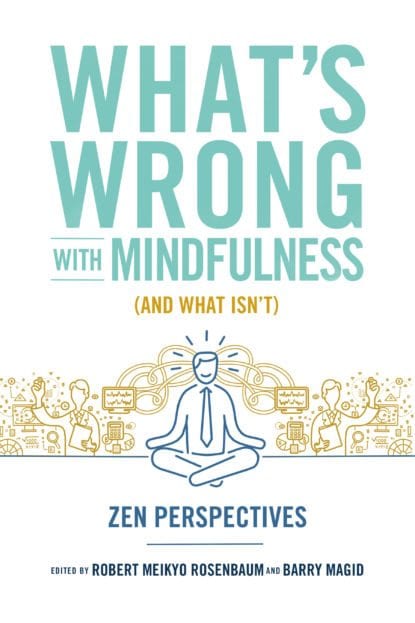What’s Wrong With Mindfulness?
Interview with Zen teachers Robert Rosenbaum and Barry Magid
We’re often told that mindfulness will benefit us by reducing stress and increasing focus and productivity, among other things. But what if our desire to obtain these benefits gets in the way of our discovering the deeper and more radical possibilities that the practice might reveal? In a new book, What’s Wrong With Mindfulness (And What Isn’t), Robert Rosenbaum and Barry Magid have collected a series of essays that explore the current mindfulness trend from Zen perspectives.
We recently had an email exchange with Rosenbaum and Magid to discuss some of the book’s major themes.
In What’s Wrong With Mindfulness (And What Isn’t), you emphasize “no gain.” Are you saying that mindfulness practice will not lead to benefits like self-control, stress-reduction, increased concentration, and so on?
Robert Rosenbaum: It’s not that mindfulness won’t lead to benefits, but rather that the more concerned we are about obtaining benefits the more we get in the way of receiving them. It’s a little like going to sleep or falling in love—working hard to make it happen interferes with the process.
Concentrating on “getting something” constrains possibilities to what you are currently able to conceive, rather than opening up to visions you can’t currently even imagine. It’s the difference between grasping at some thing and cultivating an empty field.
 You write about the secularization of mindfulness, meaning it’s been taken out of its monastic context. What exactly is lost when spiritual practices are secularized?
You write about the secularization of mindfulness, meaning it’s been taken out of its monastic context. What exactly is lost when spiritual practices are secularized?
Robert Rosenbaum: If “secular” only meant taking practices out of monastic settings and into everyday life, I’d have no problem with it. But “secular” takes on the colors of the culture at hand. In our society, this tends to be pragmatic, individualistic, materialistic, self-centered, competitive, goal-oriented, and commercial. In the West, capitalism intrudes on every area of life, making even spiritual practices commodities. Once you treat anything as a commodity and source of profit, you change it.
On a practical level, making meditative practices secular might seem to make them “value-neutral,” and thus more acceptable to medical centers and corporations seeking to utilize them for specific ends. But in reality, they take on the values of the culture at hand.
Barry Magid: Spiritual practice is the antithesis of the “means to an end” thinking that characterizes our usual secular point of view. The radical benefit of meditation as a spiritual practice is that is offers a way to step off the treadmill of asking questions like How am I doing? Am I there yet? Am I getting better or worse? It is an alternative to a world in which everything is a technique that can be done well or badly.
Mindfulness, taken out of its religious or spiritual context, brings meditation right back into that usual world of problems and solutions, progress, improvement, and techniques. Used as a technique, mindfulness in its various guises can indeed be useful for things like stress and increasing productivity. But to “use” meditation as a means to an end is to completely lose sight of what is unique about spiritual practice. “No gain” is a short hand for speaking of the opposite of “using” meditation for any purpose and seeing it precisely as the alternative to that way of thinking.
Can you talk about the tension between accepting things as they are and wanting to improve things?
Robert Rosenbaum: There is no real tension here. Suzuki Roshi once said, “You are perfect the way you are and you could use a little improvement.” This is the way things are: the relative and absolute are two sides of the same coin. True freedom involves leaping beyond both while staying within each.
Barry Magid: In Zen, “spiritual” means the experience of the absolute as inherent in everyday life. This means that the everyday has absolute value and meaning in and of itself. Things and people, just as they are, have an inherent value and perfection and are not imperfect versions of something else. We are not engaged in an endless project of refinement, purification, or self-improvement. We are simply trying to become aware of things as they already are.
On the whole, do you think the proliferation of mindfulness is a positive or negative development?
Robert Rosenbaum: To think in terms of positive and negative is to polarize. I have no doubt that the spread of mindfulness in our society has benefitted many people. But to use meditation just for relaxation and stress management—to use it as simply a tool—doesn’t allow you to realize its full potential. I’m concerned that watering it down will diminish its true transformative possibilities and that making it into a technique can limit it to how “useful” it is. This rather misses the point and also sets it up for potentially being disappointing, when it doesn’t “work” as expected.

This is ‘common-sense’ as it should be understood. There is a saying that if someone has a ‘widening of the ego horizons moment, keep it a secret, but especially from yourself.’ The moment you think you have attained something it diminishes that which you think you have attained. But having said that, of all difficult things this is ‘a’ most difficult thing.
So what do you do? Zen says ‘fetch the water and carry the wood.’ Be careful though you don’t drop a heavy piece of wood on your toes. This is a different sport of ‘common-sense’. Who said anything about ‘winning?’
Pin what Robert Rosenbaum and Barry Magid said on your walls until it fades and disappears.
Ironically, this book would seem to be an example of the very things it critiques!
I’m not convinced by the argument that “In the West, capitalism intrudes on every area of life, making even spiritual practices commodities.” Afterall, isn’t western culture just another thing which has an inherent value and perfection and is not an imperfect versions of something else?
I’m mindful that in the East, spirituality intrudes on every area of life, investing even commodities with spiritual significance.
I wouldn’t say spirituality “intrudes” on every area of life in the East. When I spend time in India, spirituality is inseparable from every area of life. There’s no separation between the sacred and the mundane — which is one of the reasons I’ve chosen to practice as a layperson, rather than as a priest or monk.
I’m not sure what you mean when you say our book is an example of what we’re critiquing. As far as finances go, the authors and editors have donated their time and efforts; nobody (except perhaps the publisher) is making any money off of this. I feel (though other lay Zen teachers don’t necessarily agree) that one of the distinguishing features of lay practice is that we choose to earn our living in ordinary everyday work (though keeping in mind right livelihood), and offer the dharma without tying financial strings to it.
When I was very young (under 21), I was going to Mass every day (I was Roman Catholic). My mother-in-law asked why I was doing that. I replied, “I’m working on my spiritual life.” My MIL replied, “Your life is your life. There is no spiritual life that is separate.” I’m 68 — I’ve ALWAYS remembered that.
Thank you so much for these wise words, I am in battle at present with my Spiritual life and my real life if I could call it that and it’s draining my energy, I am going through a tough time anyway and this is just confusing me so thank you what you say makes so much sense
2Cents __________________
So this ——————
FoodD, just FooD
Tripping from Tennessee to Michigan
the bus arrived at the station of
Indianapolis i hurried across the
Street to the White Castle and
received the sacraments of
burger and coffee, food, just food
perhaps all the universe is food only –
December Blessings ————– boK
Great perspective. As they say, we are physically healthy by taking in food but to be spiritually healthy has other means. It’s really up to every individual, to practice which way he can effectively nurture his spirit.
I feel you underestimate how mindfulness is taught and presented at its best. An open, beginner’s mind is encouraged right from the start and people are invited to hold their goals, their reasons for coming on the course lightly. I am both a mindfulness teacher and dharma practitioner and I have seen people gain insights through mindfulness practice that you would expect of seasoned vipassana meditators. Buddhist practitioners can be rather goal-orientated too – hence the coining of the phrase ‘spiritual materialism’. I do agree that the portrayal of mindfulness in the media is as a quick fix solution to modern day life and I’m sure some people will take it at that level, but at least for some there is a chance they will take their practice further.
Mediation and Yoga is excellent option to keep yourself free from stressful life…
“What’s wrong with mindfulness” is the perfect title to sell books to the inevitable “against” market that pops up whenever a new trend appears. So from a “let’s get our names out there” point of view… good move!
I checked out, “What’s Wrong With Mindfulness,” from the local library. I live in the midwest where any of a number of people claim to be doing mindfulness, including Tibetan Buddhists, a group that the more I read about them and am exposed to them the more alarmed I am by their pseudo-scientific claims. As well as their misogyny. Being a physicist it seems too much. Physics provides mathematical models of natural phenomena, nothing more. If you haven’t done the math you can’t really relate to modern physics, well. My hope was this book might provide some useful perspectives on this. Seeing that it had an essay from Gil Fronsdaal I thought it couldn’t be all bad news. Part I seems to be all bad news. Gil wasn’t included until Part II. I was too put off by then to read anymore. I checked it back in. As well, my porcupine reaction went off when I found that Barry is a psychoanalyst. It didn’t get better. Having spent 7 years with Jungian Analytical Psychoanalysts, one of whom was a former Freudian I don’t have good feelings about psychoanalysts. I made the mistake of thinking maybe didn’t matter. Seems to me it does. This book provides little hope for us in our misery. Titling a chapter “The Three Shaky Pillars of Zen in the West,” was really unkind to Philip Kapleau, who is no longer with us. First he had to contend with Alan Watts, now this.